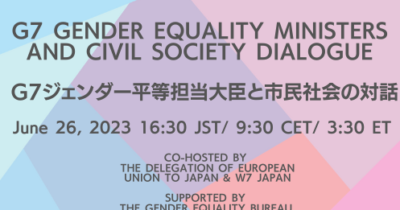C7 – P7 – T7 – W7 – Y7 Joint Statement
Reigniting the 2030 Agenda: Achieving Gender Equality Now and For Future Generations
Ahead of the G7 Gender Ministers’ Meeting, the Civil7 (C7), Pride7 (P7), Think7 (T7), Women7 (W7), and Youth7 (Y7) Engagement Groups released the Joint Statement ‘Reigniting the 2030 Agenda: Achieving Gender Equality Now and For Future Generations’ in an unprecedented show of solidarity for gender equality as a key intersectional issue for achieving the SDGs at the G7 level. This Joint Statement was created through a collaborative process between representatives of the C7, P7, T7, W7, and Y7.
Achieving gender equality is key to building resilience and safeguarding the world against current and future crises. The Joint Statement urges G7 Leaders to take urgent and ambitious steps to achieve the 2030 Agenda for Sustainable Development with a broad focus beyond the indicators set forth in SDG 5: Gender Equality. Emphasis is given to expanding social protections, ratifying ILO conventions, committing to universal basic income, increasing investment in education and upskilling, launching a people-centered and gender-sensitive measurement of human wellbeing and socioeconomic and environmental prosperity to supplement GDP, and strengthening accountability mechanisms for G7 commitments.
Finally, in response to some of the new challenges in the world today and to ensure that gender equality can be achieved now and sustained for future generations, the Joint Statement advocates for timely action to address the following additions for a post-2030 Agenda:
- Gender Equality in Digital and Emerging Technologies
- Gender Equality for All
- Gender Equality in Addressing the Climate Crisis
- Gender Equality Through Feminist Foreign Policy (FFP) and Peacebuilding
- Equal and Affordable Global Health Access and Comprehensive Sexual and Reproductive Health and Rights
- Gender Equality in Food and Nutritional Security and Supply Chain
Please refer to the statement (PDF) from here.
C7 – P7 – T7 – W7 – Y7 Joint Statement
Reigniting the 2030 Agenda: Achieving Gender Equality Now and For Future Generations
We, the Civil7 (C7), Pride7 (P7), Think7 (T7), Women7 (W7), and Youth7 (Y7), remind the G7 leaders of the immediate and long-term impacts of education and human capital losses dramatically deepened by the Covid-19 pandemic, with even more severe consequences in regions impacted by armed conflicts and exposed to natural disasters, including global warming. Following the G7 Leaders’ Summit in Hiroshima, we unanimously call upon the G7 Presidency of Japan to take robust initiative ahead of the 2023 United Nations general assembly meeting and to gather commitments from the G7 and beyond to achieve the 2030 Agenda, a whole-of-society and gender-responsive approach to innovative solutions, and a common strategy among G7 leaders for progress now and for future generations.
In light of the multiple challenges of the day, strong, resilient, and comprehensive civil society engagement is critical to achieve the 2030 Agenda. This means working across generations and genders, leaving no one behind and instead, ensuring that human rights and related international treaties and conventions, including CEDAW and its Optional Protocol, are respected as the cornerstone of inclusive communities. Achieving gender equality is key to building resilience and safeguarding our world against current and future crises, including climate change, sustainable peace, health equity, food security, supply chain, gaps in access to digital and emerging technologies, and ensuring social inclusion, human rights, and dignity for all.
We, the C7, P7, T7, W7, and Y7 Engagement Groups, stand united on the critical importance of achieving and sustaining gender equality in this G7 Joint Statement. We call for G7 Leaders to prioritize ambitious public policies and investments in developing social infrastructure to achieve gender equality, to build honest, strong, unequivocal and universal support of the 2030 Agenda, and to lay the foundations for a more sustainable and prosperous future for all.
We call for: 1) expanding social protection to protect workers and their families, especially women and including migrant workers and marginalized and underrepresented groups; 2) ratifying and effectively enforcing ILO conventions on freedom of association (87), collective bargaining (98), and sexual harassment in the workplace (190); 3) committing to universal basic income and pay transparency legislation; 4) increasing public investment in education, training and upskilling, and recruitment of health workers; and 5) launching an innovative people-centered and gender-sensitive measurement of human wellbeing and socioeconomic, and environmental prosperity to supplement gross domestic product (GDP), including a comprehensive and concise set of indicators focused on multidimensional wellbeing.
We call for strengthening accountability mechanisms for G7 commitments including the continued support and the expansion of the G7 Gender Equality Advisory Council (GEAC) and the G7 Dashboard on Gender Gaps in collaboration with the OECD and civil society, to provide accurate, timely, and gender-disaggregated data on progress toward gender equality. We call for the recognition and support of the G7/G20 dashboard introduced by T7 Japan.
Given the urgent and accelerating changes in our world and with a view towards achieving sustainable progress in gender equality both now and for future generations, we call for responsive and timely policymaking and the following additions for a post-2030 Agenda.
Gender Equality in Digital and Emerging Technologies
- Engage a whole-of-society approach in establishing human rights-based AI regulations and ensure that existing gender discriminatory biases are not translated or amplified in AI systems. Commit to developing international guidelines on gendered hate speech and technology-facilitated gender-based violence (tfGBV) in line with the Rabat Plan of Action, CEDAW, Women Peace and Security agendas, and the Universal Declaration on Human Rights.
- Transform education curricula to include gender-responsive digital skills and STEAM education from primary grades and expand meaningful mentorship programs between girls and women in STEAM. Ensure that women are skilled and competitive in the digital job market and support lifelong learning and labor mobility for women by funding gender-responsive public programs on digital literacy and skills, strengthening women’s digital talent pipeline and entrepreneurial capacity in FemTech.
- Increase women’s access to gender-responsive digital healthcare services and financial products. Increase funding for online platforms providing critical information and aid to those suffering from domestic violence, sexual harassment, and mental illness.
Gender Equality for All
- Fulfill commitments in the G7 Elmau Leaders’ Declaration to ensure the full, equal, effective, and meaningful participation of LGBTQIA+ people in society; legalize same-sex marriage and enhance legal protection for same-sex partnerships and their families; and enact anti-discrimination laws to protect those of diverse SOGIESC with indicators tracking inclusion across a range of policy areas.
- Ensure meaningful participation of all genders, with an intersectional approach, at every stage of decision and policy making processes at the national and international levels and allocate funding for civil society-led organizations and human rights activists that support the LGBTQIA+ community.
- Fund programs supporting bodily autonomy and self-determination and increase funding to provide comprehensive SRHR, integrated GBV prevention and mitigation services, and protection of the rights of women and girls in all their diversity and persons of diverse SOGIESC.
Gender Equality in Addressing the Climate Crisis
- Strengthen climate adaptation capacities for vulnerable people and communities—women, youth, children, people with disabilities, Indigenous Peoples, the poor, elderly, rural communities, and others affected by marginalization and discrimination, and support access to a safe, livable world with clean air, water, sanitation, hygiene, food, health, and adequate housing.
- Promote participation of women, youth, and other marginalized groups and communities in decision making on climate and environmental policies. Pursue gender-equal budgeting processes, allocation, and tax policies at all levels in international development policies.
- Increase investment in jobs and skills for a low-carbon transition and expand inclusive, gender transformative climate education policies which foster knowledge, skills, attitudes, and behaviors that enable women and girls to engage in sustainable, safe, rewarding, and dignified work.
Gender Equality Through Feminist Foreign Policy (FFP) and Peacebuilding
- Work toward adopting and implementing feminist foreign policies that are coherent across all foreign policy areas, including diplomacy, security and defense, trade, humanitarian assistance and development, and ensure that their implementation remains accountable to feminist civil society.
- FFPs must build on existing commitments, including full and effective implementation of UN human rights treaties, CEDAW and its Optional Protocol, the Women Peace and Security Agenda, Youth Peace and Security Agenda, and the Global Compact for Migration. They should affirm and increase funding for the four pillars of the Women, Peace and Security and Humanitarian Action Compact.
- Ensure that 100% of bilateral allocable Official Development Assistance (ODA) funding integrates gender equality as a target. Secure at least 20% of ODA funding for programs with gender equality as the principal objective, and at least 10% directed at feminist and women-led NGOs, including locally led organizations.
Equal and Affordable Global Health Access and Comprehensive Sexual and Reproductive Health and Rights
- Deliver on past international agreements on comprehensive sexual and reproductive health and rights (SRHR), stop Gender-Based Violence (GBV) with robust measures to end impunity and guarantee access to redress, and set a 10-year International Women and Girls Health Action Plan to Eliminate the Gender Health Gap with targets, funding, and full inclusion of women at every stage of the decision-making process.
- Increase funding for SRHR campaigns and advocacy to ensure access to menstrual hygiene products, contraceptives, including low-dose pills and emergency contraceptives, safe abortions, essential information about SRHR, menstrual health and gynecologic diseases, inclusive of trans and non-binary people, and dismantle social stigmas.
- Legislate and subsidize flexible care and parental leave options to achieve a more inclusive work environment for all parents and families based on a recognition of care as public good, and reward unpaid work/care starting with reviewing the impact of care work by gender disaggregated data.
- Enhance global cooperation and partnerships to support pregnant women worldwide by providing sufficient nutritious resources, comprehensive health education, and maximize the global social impact of dismantling harmful stigmas, including body size stereotyping, that contribute to restricted access to safe perinatal care and nutritious food.
Gender Equality in Food and Nutritional Security and Supply Chain
- Ensure a just and inclusive transition to sustainable food systems and the right to healthy and climate-friendly diets by fostering agro-ecological systems with a focus on small-scale farmers and women, stop harmful subsidies, and seek to end hunger and malnutrition, while ensuring human rights of laborers and women’s equal access to land and property rights.
- Increase funding for and invest in women in rural development, provide support to build skills, and facilitate access to markets, resources, assets, credit, and crop and livestock diversification and expand and invest in affordable AI technology and digital advisory services in agriculture, with gender-sensitive training for women, to improve the wellbeing of smallholder farmers and food and nutritional security, as women make up a significant portion of the agricultural labor force.




